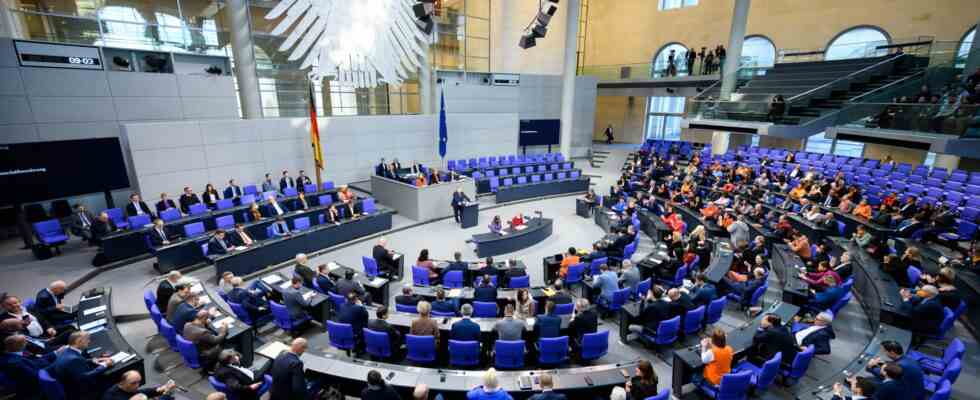Status: 03.01.2023 07:54
A good resolution in politics for 2023 is to shrink the Bundestag to its normal size. Proposals for a reform of the electoral law have long been available, and there is also time pressure – why is there still no progress?
Everyone agrees on the matter: the Bundestag must become smaller. There are currently 736 MPs in Parliament. Its legal size is actually 598 seats. One reason for the development of the XXL Bundestag are overhang and compensation mandates.
SPD, Greens and FDP want to abolish these mandates. Last May, traffic light electoral law experts made some suggestions on this. However, a draft law is still a long time coming.
Bundestag President Bärbel Bas is getting impatient. In an interview with the ARD Capital Studio she says: “I’ll definitely press there.” At the beginning of the year, a draft has to go to parliament, so in the next few days.
If not now, then the GroKo law will apply
The SPD politician is putting pressure on, and there’s a reason for that: the constituencies for the 2025 federal election will soon have to be tailored. If the traffic light groups do not create an electoral law reform now, a change from the previous legislative period will take effect.
Union and SPD had agreed during their time in the grand coalition to reduce the number of constituencies nationwide from 299 to 280. That should prevent an ever-growing Bundestag. However, fewer constituencies also means larger constituencies. And a redesign is also a risk for some MPs: What if your own stronghold is suddenly in the other constituency? Thoughts that many MPs also had in the traffic light parties, such as FDP parliamentary group leader Konstantin Kuhle ARD Capital Studio confirmed.
According to him, there are discussions in the parliamentary groups about how the constituency is shaped and how it can be ensured that the number of mandates falls. However, Kuhle is confident that the traffic light will make progress on these points in the coming weeks.
A problem especially for the CSU
The FDP politician and his colleagues from the SPD and Greens propose that in future parties only get as many seats in parliament as they are entitled to based on the result of the second votes. That would be a problem, especially for the CSU. In the last federal election, she won 45 of 46 direct mandates in Bavaria. However, since she only won 31.7 percent of the second votes, eleven overhang mandates emerged. Only the CDU in Baden-Württemberg got one more.
The nationwide total of 34 overhang mandates were then offset by 104 additional mandates so that the majority situation is not distorted. Three overhang mandates were not compensated according to the current rules.
Much resistance – to the point of lawsuit
If the traffic light reform were implemented, there would be no more overhang mandates. It is still unclear who will then represent the constituency in Parliament. The original plan to allocate the district via a substitute vote met with great resistance – in the traffic light, in the CDU and especially in the CSU.
Regional group head Alexander Dobrindt had already announced a lawsuit in the summer. The plans of the traffic light are clearly unconstitutional. And Dobrindt goes one step further: “It’s actually close to election fraud with an announcement.” The CDU also rejects the traffic light plans, although the criticism is not quite as harsh as that of the CSU.
“…and that applies to you too”
FDP parliamentary group leader Kuhle has not yet given up hope of getting the CDU and CSU on board. The Union must come down to earth. “If you want a smaller Bundestag, then that’s only possible if there are fewer MPs. And that affects you too,” said Kuhle, referring to the CDU and CSU. A reform of the electoral law needs a broad majority so that the next government does not immediately change the law again.
However, the votes of the Union are not necessary. The traffic light could also implement the plans on its own – if the SPD, Greens and FDP agree. The time pressure could increase the chances for the reform: either the MPs now agree to the plans of their electoral law experts, or the reduction of the constituencies begins.

